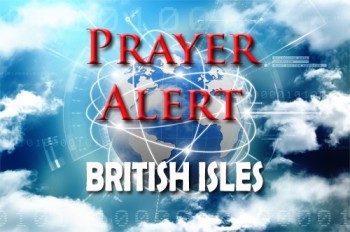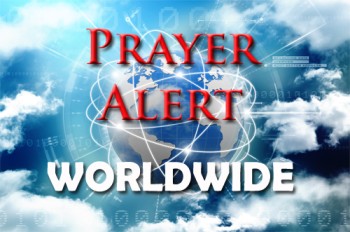Displaying items by tag: Africa
Malawi & Mozambique: Record-breaking Cyclone Freddy
Freddy has weakened then re-intensified breaking all records and has the highest-ever accumulated energy for a single cyclone. This long-lasting cyclone refuses to dissipate, tearing through Malawi and Mozambique. 190 have died in Malawi, many more are injured and 5 are confirmed dead in Mozambique, but the extent of damage and deaths is not yet clear and expected to rise. Mudslides are hampering searches for survivors and many affected areas are cut off. The church is already responding with shelter and food for those whose homes are destroyed and giving psychosocial support to the bereaved as they bury the dead. Malawi's power supply has been crippled with most parts of the country experiencing lengthy blackouts. Cyclones are expected this time of year, but they are becoming much more intense and dangerous due to climate change. Pray for God to wrap his arms around all who are affected by this disaster.
Kenya: I went into debt, trying to get a miracle
Evarline is hundreds of pounds in debt, after paying a pastor to pray for her. She lives in a Nairobi slum and can no longer provide for her four children. Evarline lost her job so when she heard about a pastor whose prayers could make life better, she went to see him. He asked her for 15,000 Kenyan shillings (£96). This is called a ‘seed offering’: a financial contribution to a religious leader, with a specific outcome in mind. She borrowed the money from a friend, who took out a loan on her behalf. She had been told this pastor's prayers were so powerful that she would see a return on her money within a week. The miracle never came. The loan her friend took out ballooned due to unpaid interest. She has no idea how she'll pay it back. Her friend has stopped talking to her. She still has no job.
Seychelles: Island paradise captive to heroin
10% of Seychelles is dependent on heroin. Addiction threatens to overwhelm them. Foreign workers are brought in to do the work that drug-dependent locals cannot do. Seychelles is number one in the world for heroin consumption. Tanzanian guards are in the jail to stem heroin flowing into the cells, but it’s not working. The jail no longer has a methadone programme or counselling sessions to treat heroin dependency. Addicts outside prison can get free Methadone if they register. Surprisingly, in a nation captive to heroin, methadone is the only support available. Taking methadone without detox and counselling is not a good solution. Yet, all residential rehabilitation centres are closed. However a grant from the UAE has been released to build a rehabilitation centre. Pray for this to begin to turn around Seychelles misery. Heroin enters Seychelles by boat and is sold in improvised shops in people’s homes. A cottage industry with whole communities involved.
Sudan: school for peace
‘Peace is the wish of everyone in Kadugli,’ says Bishop Hassan James. The area suffered decades of civil war and has recurrent tribal violence, cattle theft, murder, intimidation and displacement. Against this volatile backdrop a symbol of hope for the present and future has risen and flourished - the Peace Episcopal Primary School, supported by the diocese. ‘We started the school as the society needed more options for affordable children’s education; especially orphans, poor families and Christian children,’ said Hassan. ‘It’s called The Peace School because living in a war zone, needing peace, we must teach children about peace.’ Over 480 pupils from ages 6 to 15 attend, with a separate kindergarten for 80 children. Bishop Hassan works hard to promote peaceful relationships between the Christian and Muslim communities. He regularly speaks on the need for peace via local radio and advocates for peace and reconciliation efforts with local authorities.
Nigeria: young people may influence election results
Spurred on by the 2020 EndSars anti-police brutality protests that morphed into calls for good governance, millions of young people in Nigeria have registered as first-time voters for the elections on 25 February. The man many are backing for president, Peter Obi of the Labour Party, is not that young at 61. Nor is he really a new broom in Nigerian politics as he was previously the vice-presidential candidate for the main opposition party, People’s Democratic Party (PDP). But he is considered an outlier because of his accessibility, simplicity, and his record of prudence with public funds when he was a state governor. Under the watch of President Muhammadu Buhari, who is stepping down after two terms, young middle-class Nigerians have seen their finances battered by record levels of inflation. One in three of them cannot find a job, students have experienced incessant strikes by lecturers, and many of Nigeria's finest are desperate to leave the country. On top of this, widespread insecurity has seen armed groups kill more than 10,000 people and abduct more than 5,000 last year alone, according to the International Crisis Group. Mr Obi has been openly supported by Nigeria's huge evangelical Christian movement in the south, and can also rely on the votes of Christians who feel persecuted in the mainly Muslim north.
Namibia: baby abandonment
In 2019, Namibia passed legislation saying that women who, out of desperation, took the drastic step of abandoning their child, would no longer be prosecuted. Abandoned babies were dying. Safe places where an infant could be left were established, but there is still not enough awareness of the legal changes. Linda left her baby in a baby-saver box - a drawer built into a wall of a compound in Swakopmund that has a mattress and a blanket inside. There is also a letter. ‘Dearest mommy, please know that we do not judge you,’ reads the reassuring note. ‘We cannot begin to understand the circumstances that have brought you here.’ Linda knows her baby is safe. But despite the change in the law, babies continue to be abandoned in unsafe places. Between 2018 and 2022, 140 babies were abandoned - far more than those left in safe places.
Kenya: farmers battle birds
Sometimes called ‘feathered locusts’, queleas are pests across eastern and southern Africa. A quelea eats 10g of grain daily. Not a huge amount, but flocks can number two million and collectively consume 20 tonnes of grain in 24 hours. The UN's Food and Agricultural Organisation estimates that £41m worth of crops are lost to the birds annually. The latest quelea invasion in Kisumu, amounting to ten million birds, has already decimated 300 acres of rice fields. Another 2,000 acres are still at risk during the harvest season. Worse hit is Narok county where the birds invaded wheat farms, destroying 40% of the harvest. The prolonged drought in the Horn of Africa has meant fewer seeds from wild grasses, a primary source of food for queleas. Kenyan scientists suggest this may be behind the invasion of cultivated land as the birds look for alternatives.
UK urged to finance South Sudan peace-building
A Christian Aid poll reveals 53% of British adults agree that the government should be a leader in providing humanitarian aid and commit to financing a peace process in South Sudan. The leaders of Christian Aid, CAFOD, and Tearfund have written a joint open letter to the PM after the Pope, the Archbishop of Canterbury, and the Moderator of the Church of Scotland visited South Sudan last week. The charities warned of South Sudan’s growing hunger crisis with 54% of the population already living with crisis-level food insecurity. Despite the worsening situation, the UK's aid budget for South Sudan was cut by 59% in 2021. This triggered cuts to critical peacebuilding and resilience work with communities. CAFOD’s director said that the people of South Sudan have suffered much due to conflict and instability, but instead of being able to rely on UK support, the UK has cut its funding.
Malawi: cholera outbreak
A cholera outbreak in Malawi began in March 2022, but fatalities doubled last month: 1,093 deaths have been registered. Malawi is one of the poorest nations in the world. In impoverished communities with little access to clean water, a deadly disease like cholera spreads quickly. The high fatality rate could be due to long distances between health facilities and affected communities, resulting in delayed access to rehydration treatment. Currently there are 600 new cases per day. Malawi usually counts a few hundred cholera patients per year. Pray for the Malawi Red Cross Society providing lifesaving treatment at the community level with oral rehydration therapy. Volunteers ensure that water supplies are safe and that sanitation facilities are working. They also go door-to-door, raising awareness on preventing the disease from spreading. Pray for more agencies and volunteers, to deliver all that is needed to halt the spread.
Nigeria: ‘out of these ashes’
Violence against Christians returned in January, with more believers killed or kidnapped almost every day. Fulani herdsmen killed five Christians on 22 January, in northeast Nigeria, following the slaughter of twelve believers the previous Friday. In a predominantly Christian area of Bauchi state, residents said militant herdsmen attacked one community, killing five Christians and kidnapping another. The area has been attacked by Islamist terrorists and Fulani herdsmen for several years and many villages have been destroyed, driving Christian survivors to other parts of Nigeria. On 20 January Fulani invaded another predominantly Christian community and killed twelve believers. On the 17th five Christians were killed, and Christians are under siege following kidnappings and attacks. Release International is raising awareness about this ongoing persecution. ‘Out of these ashes’ will be launched in April to inform UK Christians and encourage them to pray for those suffering for Christ in Nigeria.









